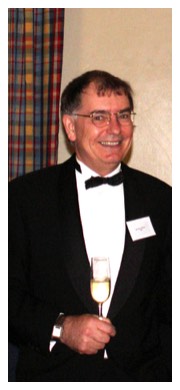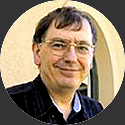
An irreverent autobiography
Prof Michael A. Dopita,
Research School of Astronomy & Astrophysics
The Australian National University.
I was born in Bohemia in 1946, a Czech-British cross-breed. I recall that I did not want to be an astronomer at first. When I was six I wanted to be an actor, by the time I was seven, it was an artist, and then I thought that an architect might be fun. Clearly, one way or another, I was going to be something starting with A. Many people now think that I succeeded.
My quest for a profession ended at age nine, in 1956, when my father took the family to Brazil, and I saw for the first time the splendour of the southern skies. I was sent to be educated at an establishment which was modelled on an English public school, but which fell far from the ideal they had created. The headmistress was a severe German who carried her hair in a sensible bun, and who maintained both a passion for corporal punishment by caning and an abiding hatred of the English. This might have had something to do with the fact that she had appeared in Sao Paulo under somewhat mysterious circumstances in 1946.
The gym master was a Maltese named Flores who liked to line us little boys up in ranks, and make us stand on one leg under the tropic sun until we started to pass out, whereupon he would award House Demerit Points to the unconscious offender. Since my brother and I came from England, we were roundly resented by the other pupils, mostly Brazilians, Japanese and Chinese, who blamed us for their suffering and lack of a decent education.
I fell foul of the trainee Chinese Triad led by one Charlie Chan, and was beaten up with monotonous regularity. After six months of this my parents packed my elder brother off to a boarding school in Hampshire and taught me the rudiments of maths at home until the rest of us returned to the UK.
On leaving Santos harbour, my father gave me a Time-Life volume called The World We Live In. My sister broke out in spots two days after leaving port, and we were put into the ships isolation ward on the suspicion it might be smallpox. Fortunately this was not the case, but this gave me plenty of time to study the astronomy section of the book, and the magnificent paintings by Chesley Bonestall. I wanted to save up for a telescope right there and then. However, weeks later I discovered that ten shillings would not quite be enough, so I blew my accumulated savings on an orgy of chocolate, which had, in England in 1957, only recently been taken off rationing.
I was fifteen before I tried once more to possess my own telescope, inspired by a Popular Mechanic book on telescope making that began Are you fond of walking? Can you fix a leaking faucet? Then you too can build this magnificent 6 inch reflector! I could walk, so that vacation I walked to local businesses looking for temporary employment. All comes to he who seeks, and for the next month I found myself standing shaking out smalls in a local industrial laundry for a take-home pay of four pounds nineteen shillings a week. The rest of the vacation found me walking round a barrel, covered in carborundum or jewellers rouge to manufacture an (almost perfect) six inch mirror.
I tried silvering it in the Hitchin Boys Grammar School chemistry labs, but all I got was a yellowish and granular deposit, and lived in imminent danger of blowing myself up by the formation of silver fulminate, so in the end I had to get the job done professionally. The telescope tube was a galvanised tube, the finder an ex-German 88 mm gun sight, and the tripod was lovingly crafted in wood. Years later I sold it to a young enthusiast in whom I saw a reflection of my youth.
For the next three years I drove my parents crazy carrying the completed telescope out into the frosty nights and back again much later, tripping on the stairs and dropping the tube covers, but I ended up with two notebooks full of observations, and a school report from my French master commenting on how I seemed to be distrait in class. My inspiration now came from Fred Hoyle's book Frontiers of Astronomy, and an early edition of Nortons Star Atlas.
After A-Levels, I was off to Wadham College, Oxford to read physics. At that time, you still needed two languages to get into Oxbridge, and I was fortunate to have my Grade 5 pass in French and my Grade 6 scrape-pass in Latin. While there I became skilled in punting, and, with the help of Simon Mitton, I ran the OU Astronomical Society. This gave me the opportunity to meet Ryle, Blackwell, Bondi, Kopal, Sir Richard Woolley and other luminaries of British Astronomy.
I had my first formal instruction in Astronomy from the ancient, charming, sparrow-like, but often somewhat incoherent Margaret (Madge) Adams. I owe her all that I know about Smarts Spherical Astronomy, and the operation of the nautical sextant. Thank you.
In the year that the Beatles released Sergeant Pepper, I was accepted in the Royal Greenwich Observatory Vacation Student program. I worked with Donald Lynden-Bell, who used to interview visitors to his office while sitting cross- legged Ghandi-style on a heap of papers and journals piled on his desk.
That summer I learned Fortran 67, how to drink Merrydown Cider, and how to do country dancing in the Herstmonceux Castle Ballroom under the critical gaze of Sir Richard van der Rien Woolley, Astronomer Royal. He was not impressed by my Cossack impressions when I should have been Stripping the Willow. In fact, I did not impress him at all, as I did not want to play cricket. He was in the habit of recruiting his vacation students into a formidable RGO cricket team to help keep the local villagers in their proper station.
One day he growled at me in exasperation Dopita, get your hair cut!, so I went into Eastbourne looking for a barbers. Getting desperate, I asked a policeman. He eying my Cavalier locks, demanded icily whether the gentleman was being serious. Being assured this was the case, he directed me, with the enthusiastic support of a bunch of old-age pensioners in bath chairs who had gathered to see who was disturbing the peace. The barber smiled in anticipation of his work, and I came out looking like the sort of skinhead that Eastbourne was trying its best to keep out a decade later. So nature balances herself. My shorn head did not help me with Sir Richard, who in his debriefing at the end of the course advised me not to try for a job in his establishment - or in any other astronomical institution, for that matter.
After graduating, I felt the need to Do My Bit For Africa, and signed up with Voluntary Service Overseas. I ended up teaching maths and physics in Tanga Secondary School in Tanzania located in the middle of a coconut plantation four degrees south of the Equator. I shared an ex-German ex-colonial house with a Canadian CUSO Volunteer, and with an English VSO who was an expert on cattle insemination. The house was run by Frederick, the resident house-servant, who lived in true colonial style with his family of six in a little house in the back yard, and cooked magnificent meals out of whatever we brought from market. The house was on Raz Kazone overlooking the harbour and the scene of a famous defeat of the British by Colonel Heinz von Lettrow in 1916.
I decided to build another telescope - making sure that VSO contributed the mirror this time - using canoe technology for the tube (formers, stringers and cladding), and the truly-equatorial telescope was finished off with an eyepiece taken from a theodolite. For many years it remained, and may still be for all I know, the largest telescope in Tanzania.
All good things finish, and I returned to London, to teach at the Dame Alice School, Islington until the beginning of the University year would finally let me start post-graduate studies. This school was run by the Worshipful Company of Brewers, and it had special dispensation to serve up beer to all classes at the end of each term! While there I went through my hippy stage, which was certainly the thing to do in the swinging London of 1970. I was a terrible teacher, I just could not cope with the savages of Inner London, after having had it so easy in Africa. However, the good news was that I ended up by winning the heart of the French Assistant Teacher who is (still!) my wife.
I also searched for a place to do a postgraduate course in astronomy. St Andrews looked much too cold and Scottish, and Edinburgh was not hiring. At Imperial College London I had a bizarre interview at which the Professor kept asking as he tossed a full ink bottle from hand to hand, What is needed to describe this? I concluded that we were not operating on the same wavelength. Mill Hill looked too much like Oxford, strangely musty and museum-like. Cambridge looked askance at my application. Since I did not have a Class I magna cum laude, I was sent a form letter finishing therefore, necessarily, your application must fail. I was in good company, because in the same year Richard Ellis, the future Plumian Professor of Astronomy at Cambridge received the same form letter. This I found out from him one convivial evening years later sharing a flask of red wine and a plate of fried herrings at a waterfront bistro in a little village in Crete.
Finally, I received one day a letter from Manchester summoning me to meet with Prof. Zdenek Kopal and Dr. John Meaburn at 4.00 pm at the Tomb of Isaac Newton in Westminster Abbey, where I was to be interviewed! On the day in question I arrived at the appointed place to find a number of other candidates milling about on the spot, and eyeing each other speculatively. Suddenly Prof Kopal, resplendent in Astrakhan coat and fur hat (and with snow on his boots?), burst magnificently down the aisle, with half his staff in retinue. He proceeded to the interviewing, firmly planted in the front pew, with his minions ranked in pecking order behind. By the time the verger came to ask whether the Gentlemen would be staying for Evensong I knew that I was at last going to turn my hobby into a paying concern. That day I walked out of Westminster Abbey, my eyes narrowed against the pale spring sunshine, firmly married to my new profession. Poor Isaac Newton must have been tossing in his tomb!
provided by Mike‘s friend, Keith Tritton
A STAR TRANSMUTED

Michael Andrew “Mike” Dopita
* 28 Oct. 1946, Kraslice, Czechoslovakia
† 22 Dec. 2018, Canberra, Australia
* 28 Oct. 1946, Kraslice, Czechoslovakia
† 22 Dec. 2018, Canberra, Australia